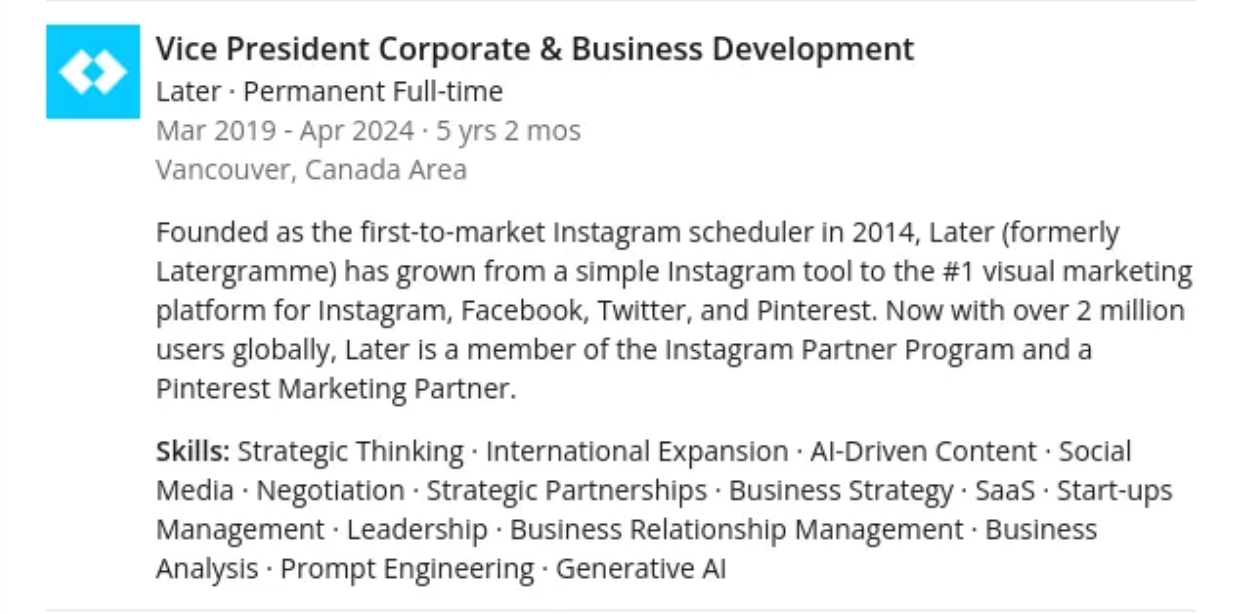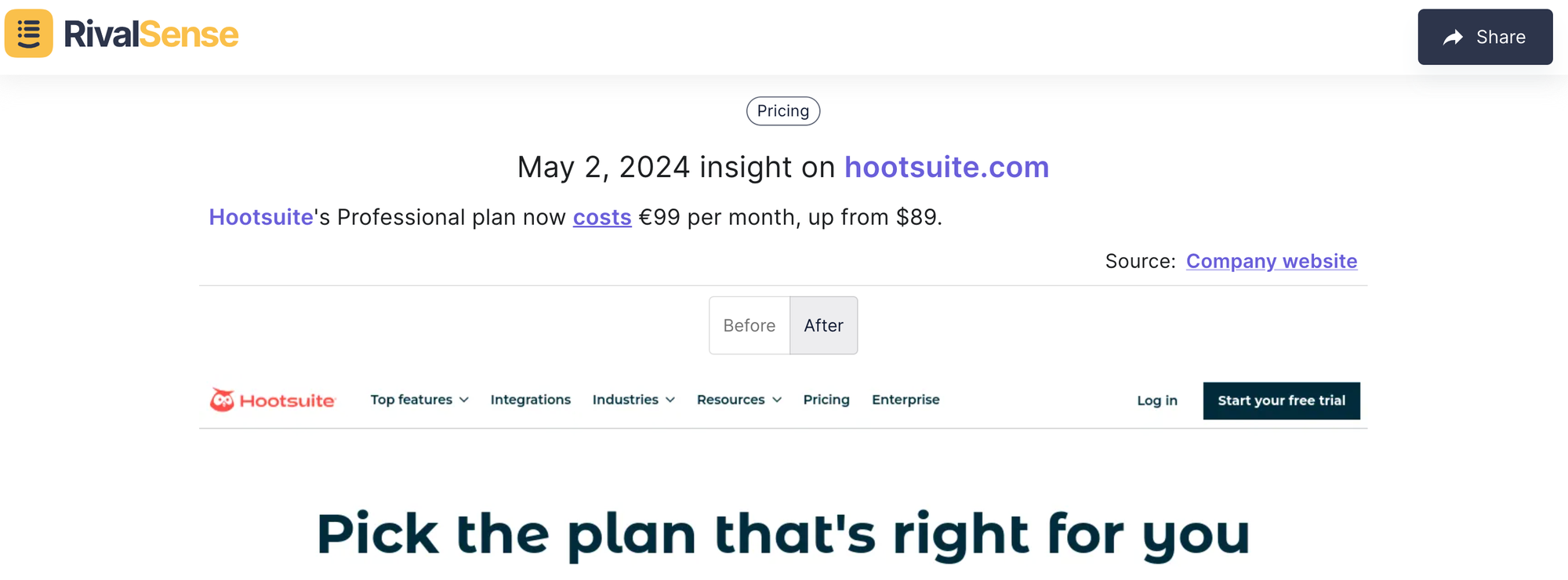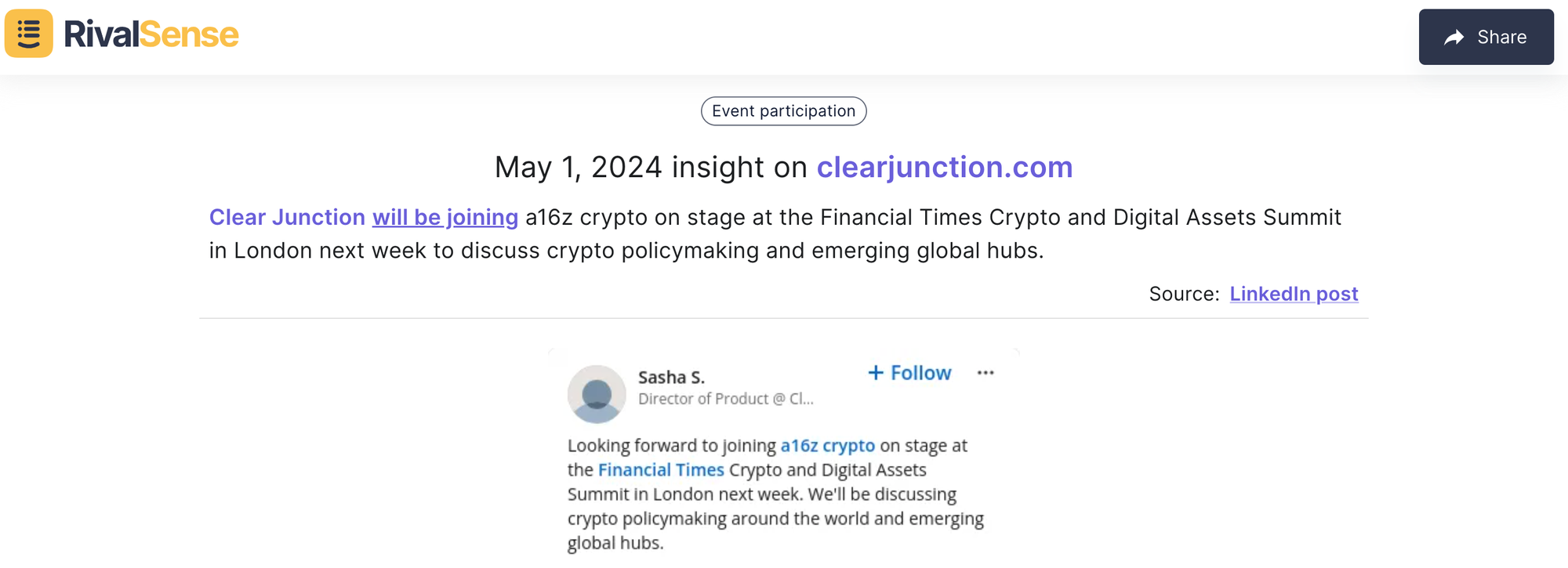RivalSense: Why Follow Your Competitors in 2024
With 2024 underway, a question entrepreneurs and executives often ask each other is "Should I regularly follow my competitors?" Other, related questions that can often be overheard: "How detailed should be my knowledge of competitors be?"
The answer requires a bit of nuance, since there are real trade-offs associated with the answer. Of course, endlessly checking for information will take up a lot of your time. You don't want to be aimlessly doom scrolling through competitor social media accounts or refreshing competitor websites without any clear benefit. On the other hand, there are real, significant benefits for your business that come from a detailed awareness of your competition. Let's look at some of them in more detail.
Reason 1: Ideas for new product features
You should not blindly copy everything your competitors are doing, but being aware of competitor product and product features can be helpful. Every product manager knows how hard it is to easily generate new ideas for testing and building; let your competitors do that.
New product features are hidden everywhere. For mobile apps, new additions in functionality are described in the version descriptions in Apple App Store and Google Play Store. For API-first products, the developer portal often contains a "Change log" where you can see what changes have been implemented. Company employees often brag about their latest contributions to their product on their X or Linkedin feeds.

You don't have to come up with everything from scratch! Often it is easier to just look at what your competitors are doing - abandon the parts that are not convincing, but implement the rest. Often, if a feature has been deployed publicly, it already has been tested internally or with a smaller group of test customers.
Reason 2: Talent you should hire
Attracting the right kind of talent can be a true pain for any executive or founder, and getting this right usually is the main reason why your plans will fail or succeed. Even if you manage to identify talented people, it often takes a lot of time to onboard them and educate them about your company, about your industry and about your products.
Guess what - your competitors are packed with talented people that already are working on very similar problems as you. They often have a good understanding of your clients, your products, your market, your regulation and your other challenges. Why not try to attract some of them?
We agree - it often is not easy approaching them cold, since your attempts often will not convert. But here is a small tip - people often leave their jobs or are let go. Linkedin never sends you a notification about this (people are understandably shy about terminating their work), but you can use tools like RivalSense to identify when your competitor employees have stopped working with them and are ready to be approached by you or your HR team.

One thing that you should be aware of when poaching top talent from your competitors - some of them might have signed non-compete agreements or non-compete clauses (NCC) that prevent them from working for a competitor of their previous employer. That really depends on the jurisdiction where you are operating in. However, if you are based in US, you should be aware that FTC has just banned non-competes and they are now an illegal practice. Any person you approach should be aware if they have signed a legally binding non-compete.
Reason 3: Pricing changes
Be careful with this reason, since it does not apply in every industry. There are some industries where you should not be overly concerned with the pricing of your competitors, since your potential clients do not view it as one of their Main Purchasing Criteria. They might choose you because of your reputation, your product features or for some other reasons.
However, there are some other industries where potential clients are extremely sensitive about your pricing, especially when compared to your competitors. Think of industries like payment gateways or cloud storage. Clients here are demanding, and have a habit of shopping around before making their decision. If your competitors have lowered their prices, and you have not adjusted accordingly, you can lose a lot of business until you are aware of what is going.
Competitors also often launch temporary discounts or introduce new pricing plans, like Team plans or Enterprise plans.
We recommend using a tool like RivalSense or others to track these changes in the websites or Linkedin posts of your competitors, so you are never surprised by these changes.

Once you are aware of the pricing changes, you are in a position to make intelligent, informed decisions on whether you should adjust. As we mentioned before, you should think about the price-sensitivity of your customer.
Reason 4: Marketing and sales opportunities
All businesses and endlessly looking for customers, and closely following your competition can help you land new business.
The precise effects will depend on your business model, but let's assume you are a SaaS company landing many clients via direct B2B sales. In that case, an important part of landing deals is strategic prospecting - knowing who your potential clients are and knowing how can they be reached.
Tracking competitors can be useful. Firstly, you will see what conferences their sales people are attending, since there it is hard to find a sales person these days that is not constantly posting on Linkedin. This conference is an opportunity to meet your potential clients. Secondly, you can see what trade publications and blogs your competitors are doing content marketing in. These publications or similar publications can be useful channels for addressing your future clients and educating them about your products.

Thirdly, you can see whenever some client case study disappears from the websites of your competitors - if that happens, there is a good chance you can add them to the list of your leads! Tools like RivalSense allow you to notice these changes in competitor websites.
Summary
Evaluate whether tracking competitors makes sense for you. Of course, following competitors can take up some of your time, but there are good tools that can minimise this time investment - opening your inbox every week and scanning for interesting insights is not a big time investment. The benefits for your business can be significant.